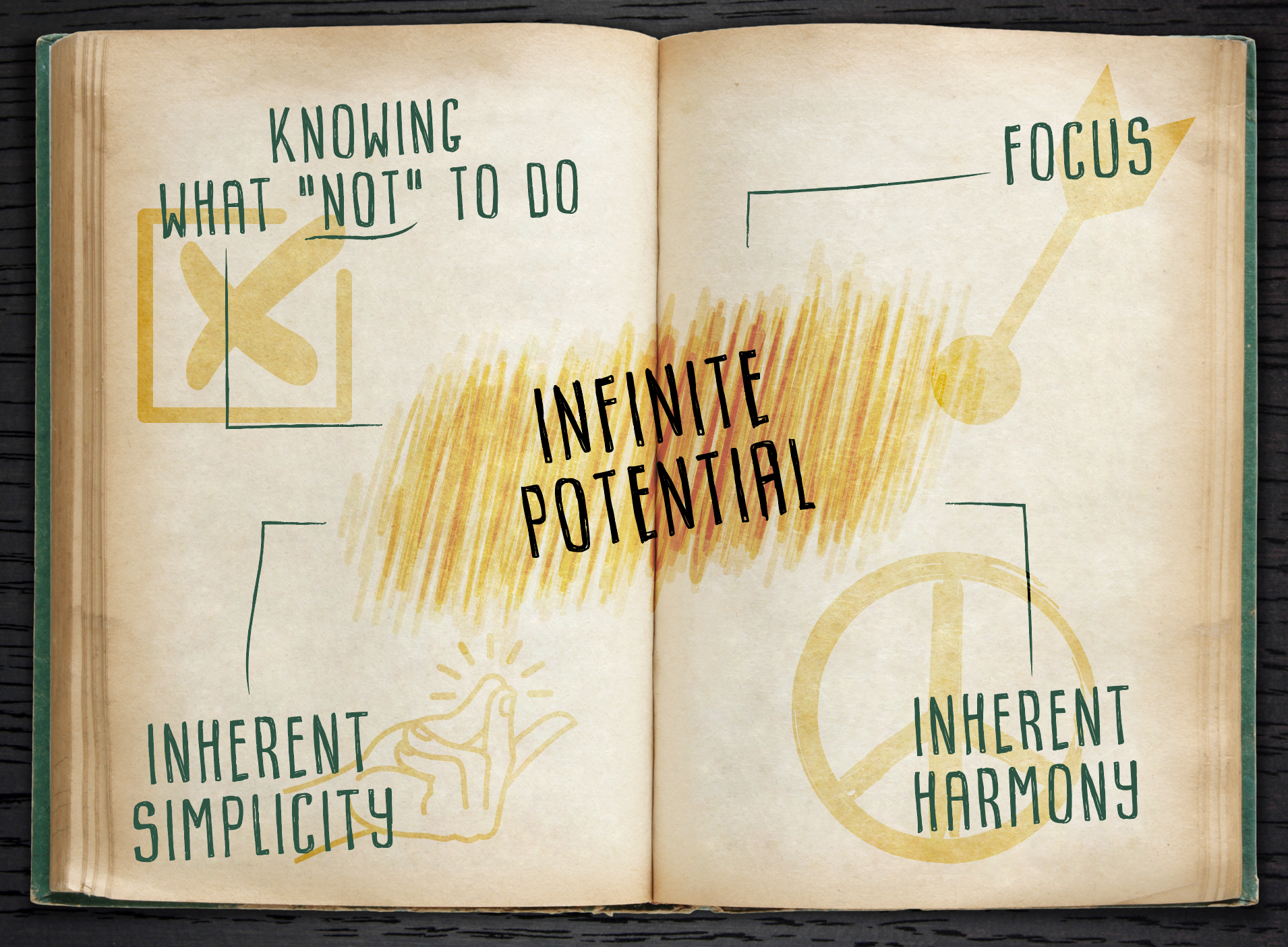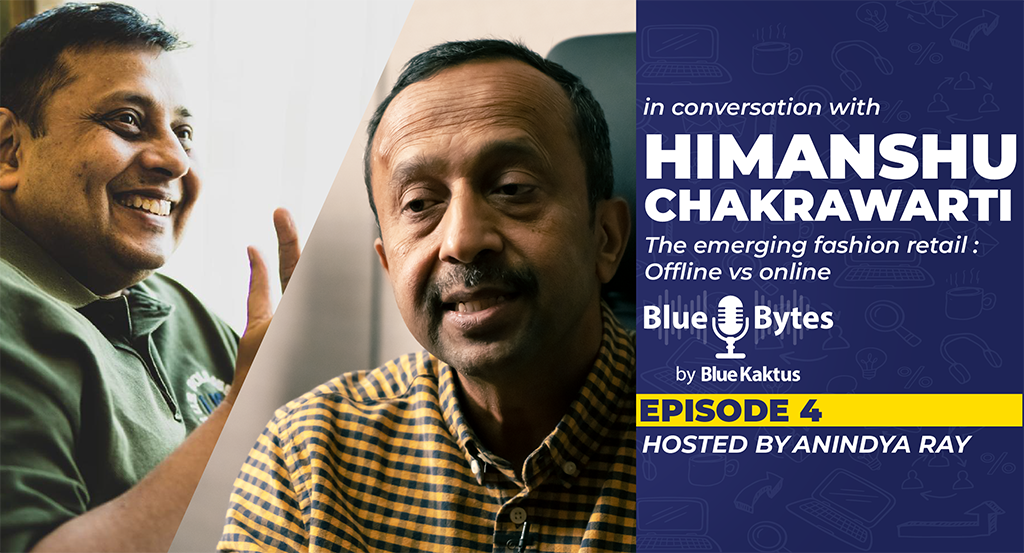Moving away from the nitty gritty of the fashion apparel industry, I wanted to pen a few thoughts on some other topics of interest on life, leadership and more.
Everyone is an expert, everyone has a point of view, some of the most researched topics … from time immemorial.
I will be honest here, I have not really read a lot of material on life or leadership nor am I an academic expert on it.
So, what makes me think that I could add something to this cluttered landscape?..
Well! Honestly, not sure…
Except that I have been a keen observer of the human behaviour and given to experimenting a lot with human endeavour.
So this is me, sharing some interesting tidbits I have picked up over the years - it’s based on personal experience and observation. Most importantly most of it are on topics few people talk about. And I do hope these lead to discussion and dialogue.
In this article I will talk about,
- Knowing what not to do,
- Focus,
- Inherent Simplicity
- Inherent Harmony
- Infinite Potential
- What holds us back
So, lets start the discussion with
KNOWING WHAT NOT TO DO
Have you ever tried to look at your to-do list and striking off what ‘not to do’ - it’s not re-prioritising; it’s simply deleting tasks.
Give it a minute . . try it . .
Impossible isn’t it?
It is, as all the tasks in the list were important tasks anyways . . that’s the reason they made it to the ‘to do’ list.
Am sharing the link to a very interesting video where we see that most people when given a problem to solve, add elements rather than remove . . even if the latter is simpler and more efficient. It’s a kind of reductive cognitive issue that most of us seem to have.
Typically given a supply-chain problem to solve we tend to add more pieces to the puzzle and we never consider the possibility of removing pieces to solve the problem.
In all human professions; all our education, we have always been taught ‘what to do’; never ‘what not to do’.
All except probably the medical profession. There if a patient goes with let’s say fever, body ache, joint pains, tiredness . . the doctor instead of treating each problem separately . . analyses the whole issue . . eliminates causes . . and then comes to the conclusion . . let’s say malaria . . and treats it.
Looking for root cause through analysis and eliminating probable causes . . also eliminates a lot of ‘to do’ lists . . leaves us with . . clarity and FOCUS. It may appear simple, if we are asked to focus on something, but true focus comes only when we also know ‘what not to do’.
Hence we see that,
FOCUS
Is not only the knowledge of what to do . . but true focus comes from clearly knowing what not to do. In fact while it appears very simple, it is not. An interesting trivia for the readers, is that this process however is the essence of ancient Indian tradition - lost to the ages now in this modern education system.
If we read Adi Shankaracharya’s poem Tad Nishkala - for 5 verses he speaks of what ‘we are not’, before moving in the last verse to finally espouse ‘what we are’. It is how in Ancient India, the tradition of finding the spirit (atmaskshatkar or self realisation) was . . to granularly eliminate each option of what we are not . . so that finally what cannot be eliminated must be ‘us’. It was called ‘Anuvopai’ (the method of the atom) to try and reach final self realisation.

Similar to the supply chain problem we discussed earlier, in life we tend to attach pieces to our identity (like Nationality, Title etc.) rather than consider removing those to better understand ourselves. This song illustrates that same point.
So, back to business . . Focus comes as much from knowing what to do as from knowing what not to do. But interestingly, if practiced this has other benefits as well . . it leads to,
INHERENT SIMPLICITY
Once the mind is cleared of all the clutter and starts seeing the cause’alty. Then no matter how complex the universe appears, there is a convergence that leads to inherent simplicity.
Modern day scientists are today searching for the ‘god equation’ of the final solution which will explain all that is. After centuries of trying to look at the world through different lenses of Biology, Physics, Chemistry and Mathematics; scientists are only now beginning to look at convergence into a single answer to all that exists.
A classic case is with modern medicine where they have doctors for every part of your body and with so much specialisation that they have forgotten that it’s only one human body. If you go to a heart specialist, she/he will give you a medicine and then refer you to the kidney specialist to understand the side effect of that medicine . . how ironic that the same doctor can’t explain both.
Searching for simplicity in what appears to be a complex world is easy. All it takes is knowing what to eliminate. And to quote ‘if it ain’t simple, it ain’t right’. Don’t know who said, but boy was he right. Anything that cannot be simply explained - is inherently flawed.
In today’s business/organisational structures, we love complexity. Excel sheets and files with sheets and sheets of formula driven numbers . . power points with complex slides after complex slides which needs a PHD to explain. And people take pride in preparing so much complexity and understanding it.
Symptomatic treatment, rather than root cause analysis through elimination, is the fundamental reason for this complexity. And sometimes the solutions which are simple look counter-intuitive - but are extremely effective. To take the earlier example a medicine for malaria will resolve all four symptoms of the patient . . while the conventional wisdom would be to go for four different medicines for each of the four symptoms.
Once we reach this state of inherent simplicity, it actually leads to,
INHERENT HARMONY
We are used to always working and living in conflict. However, once simplicity is established through focus, groups start working harmoniously together as they all see the root cause and understand the real issue rather than work at cross-purposes to attack symptomatic issues.
Of course, this inherent harmony is possible only if two preconditions are fulfilled:
-
- that everyone clearly understands the solution, what it does, why and is clear of the processes required to reach that goal and
- the basic premise that all people are inherently good - they do not get out of bed and think, ‘today I will make sure I destroy everyone’s work’, instead they start the day feeling positive and wanting to achieve some good, hence working sincerely towards goals/processes as defined above.
And if harmony is achieved, then it leads to what can only be defined as
INFINITE POTENTIAL
Which when realised can give exponential growth . . much beyond expectations. It’s interesting when we look at what can be achieved in leadership scenarios if they follow these simple fundas.

Unfortunately, we have too many leadership coaches, sessions, colleges, and god only knows what else. But what no one teaches today as a discipline is ‘what not to do’ and how through analysis and elimination - one can focus, simplify, harmonise and reach the true potential of the leadership endeavour.
In fact this process was so ingrained in Ancient Indian Tradition, it was taught along with ‘chitta nirodh’ as a way to self realisation or as they say moksha.
Having said that, let’s also try to understand,
WHAT HOLDS US BACK
And the answers to that million dollar question are simple,
-
- Education that does not teach us how to reason and think; instead achieve by rote and reproduce . . and root cause analysis is required for higher order thinking.
- False societal understanding that to complicate and be busy is smart . . whilst actually it’s the other way around . . to simplify and make easy is genius and
- Intellectual honesty . . bereft of previously held mental models.
I will simply conclude it here by saying that we should all look at this process of focussing, simplifying and finding harmony that will unleash infinite potential through minimal effort. It’s easy . . just requires the courage to experiment and start.
I am sure I will get a lot of comments, agreements and disagreements and discussions on this. Look forward to your thoughts, please do comment in the section below.
RELATED TOPICS:#Apparel,Anindya Ray
Leave a comment
Our email address will not be published. Required fields are marked *







11 Comments
NareenApr 13, 2022 at 16:37 pm
Excellent Article! Very well put across each of the points mentioned and detailed by you make anyone a better leader.
RayanindyablogsApr 15, 2022 at 06:18 am
Thanks Nareen
SachinDec 29, 2021 at 16:37 pm
Wonderfully articulated thoughts Anindya! The correlation with Ancient Indian traditions is just amazing!
ShashidharNov 25, 2021 at 11:38 am
A wonderful article! Decluttering and simplifying is priceless. It is a way of give ourselves the best chance of allowing 'magic' to actually happen in our lives. Only a person who has actual experience can so clearly explain the utility of the great Adi Shankara's teachings in our daily lives. Such a refreshing change from the usual jargon. Thanks Anindya for sharing this thought.
Sanjay LalOct 20, 2021 at 10:47 am
Making a simple thing complex is a human nature and added to it is the human ego. To this complex human nature, fuel was added by the so called corporate houses. Then the management courses were introduced which taught how to make a simple problem into a complex problem and then the excel sheets and systems of meeting was introduced. A youngster armed with excel sheet, which made no sense at all was introduced into a glittering meeting room thus boosting his ego. Result was phenomenal. While ego was boosted, youngster was unable to finish assigned work in time. His ability to think straight or be on the floor to solve the problem at hand was clouded by "gyan" in the meeting. He is left to find solutions in the excel sheet. How does the management gurus trying to resolve the delay caused by delay in trims, or tailors being absent, or faulty fabrics, etc through excel sheets? How is the youngster supposed to develop human relationships with a factory with an inflated ego fuelled by corporate "gyan" and excel sheets. In short, apparel industry is a very simple industry and works on human touch. A very well written article dealing with the true nature of our industry.
DipinOct 19, 2021 at 09:57 am
very helpful...
Raja ChidambaramOct 18, 2021 at 15:45 pm
Dear Anindya, Well written article. I have seen this in many people from across Industry. Ability to to clinically know what not to do leads to razor sharp focus because one is able to see the inherent simplicity of a situation. However our mindsets that "I have to be busy" & "I have to look good in others eyes" makes this difficult. After this if one believes people are essential god and capable this leads inner harmony for every one in the team and thus harmony becomes inherent to that team and the system. This attitude would mean unlearning all bad habits of the past for many of us. Thanks for triggering thought!
NeerajOct 18, 2021 at 10:11 am
A brilliant Blog this one Anindya !! I think complexities are created for several reasons, most of the times a task gets complex because everyone’s trying to show their body of work to impress, rather than focus on end result. Almost everyone wants to take the half circle instead of going straight. I also feel creating complexities equates to manipulation to a large extent. Manipulating facts and figures should only be used as a marketing tool. The math should always be right inside ones head. 1+1 can only be 2 but if someone’s says 1+1 equals to 3 it’s simply fooling your own self. In any business the closer we are to reality the less complex things will become.
Manoj Kumar M ROct 17, 2021 at 21:35 pm
Just as speed breaker makes us alert on the road at the moment as we pass over it, Similarly the speed limit board besides the road guides us to be cautious about what is not to be crossed in driving. Ultimately the target is to have a safe drive. Yes Sir, Knowing what is to be not be not done is also much important than what we do in a routine. Sir, It is a Wonderful article well explained. Great Learning ???
Prashanth HVOct 17, 2021 at 14:35 pm
Less is more. This is the most difficult thing for any human being. There will be so many people who will argue if one is focused on only fewer things and leave comments as not updated.
Kripa shankerOct 17, 2021 at 09:49 am
Dear Sir, Good point put forward, great insight on what not to do, also bringing harmony will actually help unite as one team and focus on single common goal. You have brought this thinking among us so as to sit back relax and rethink on what we have been trying to do just by adding more and more in the race of improvement rather than being content and thinking what can we eliminate. Thank you